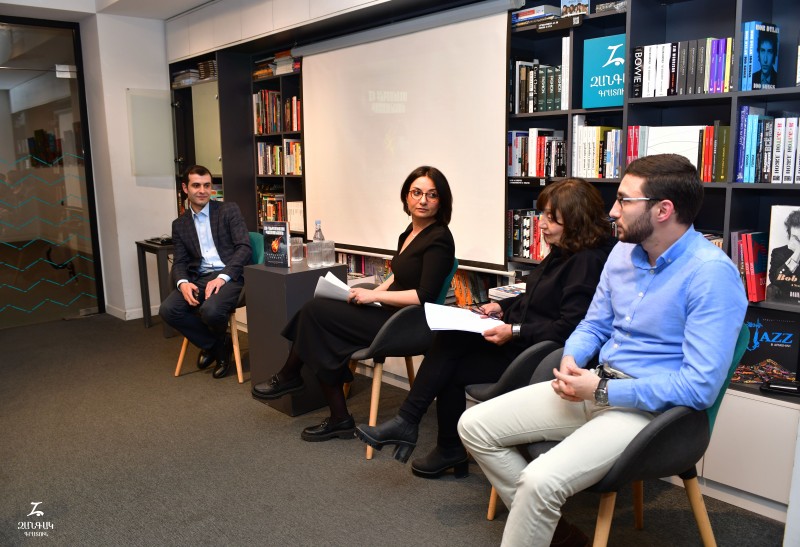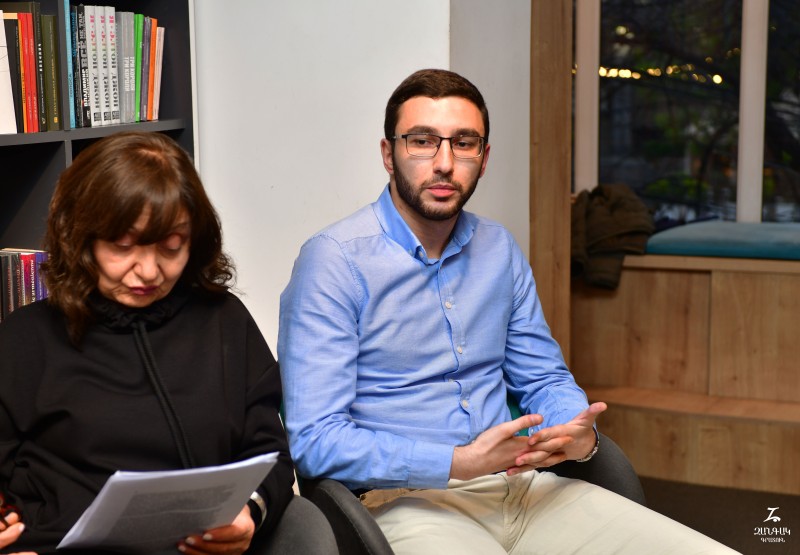Newmag presented Sebastian Haffner's memoir "The Story of a German" to readers in "Zangak" bookstore (photos)

"Newmag" presented the German writer, journalist, historian, and lawyer Sebastian Haffner's "The Story of a German: The individual against the thousand-year-old Reich”. In his memoir, the writer depicts the life of Germans during the rise of Nazism and du
Sebastian Haffner spent his youth in Germany between the two world wars. In his book, the writer vividly portrays the gradual hardening and brutalization of public attitudes, prejudices, and politics stemming from the political events of 1907-1933. Serving as an eyewitness, he chronicles in the book the rise of the Hitler Youth movement and the subsequent Nazi coup.

At the presentation, the translator of the book "The Story of a German" Mariam Gurzadyan stated that one cannot unequivocally claim that the literary work is about Hitler, it is about an individual, a person who describes the events happening around him. "A typical average German starts doing this from childhood. From the First World War, how it began, how it ended, that transformation, from childhood to adolescence, the period of adulthood, etc. We are witnessing an era that we know about from historical accounts, but not from an individual's point of view."


The translator lived in Germany for many years and testified that this book was a bestseller there for many years, German intellectuals know and love Haffner. According to Mariam Gurzadyan, the novel gained a new wave of relevance in recent years, especially after the Russia-Ukraine war. "For them, the topic is very topical, they have the greatest sense of responsibility, the feeling of self-flagellation and guilt continues to exist in that society when we observe that it is gathering a lot of momentum."

Speaking about the atmosphere prevailing in Germany during the given period, the editor of the book, Tatevik Nalbandyan, noticed that although this book was written 100 years ago, about a different nation and by a different individual, there are episodes, characters, and events that are very familiar to us. "The most amazing thing about this book is that this story, written 100 years ago, can be so familiar. In my impression, the individual was defeated by that state machine, he could not change anything, the opposition was divided, dissent was destroyed, and he saw before his eyes the supreme court, about which there was a legend, according to which the judges decided to arrest and rejected the demand of Frederick the Great, which was considered illegal.
Now that same court is being turned into a humiliating court by the representatives of the underprivileged group before the eyes of the author. The nation was subjected to propaganda and mass deception, how did it happen, and how did it lose its sanity? That individual feverishly seeks the answer to these questions."

According to political scientist Hovsep Babayan, the author explains the phenomena in the book by the nature of the German people. Haffner talks about the general mood, the states of the German people reaching mental disorders, and he, as an individual, put his feelings on paper on the one hand, and on the other hand, the chronicle of the happenings, trying to put it all side by side and show the viewer how it happened that after all, the German people tolerated or ignored the rise of Nazism;
"According to the author, in the beginning, there was excitement because he was young, even though there was a war and everything around was a disaster, but over time it disappeared and a period of nihilism, and emptiness began. And when that generation loses interest in life, after all that, a dull peace begins. The Nazis were able to offer interest in exchange for that boring peace and touch the nerve, which was the nerve of revenge and bringing everything back, the nerve of victory, and it worked."

The speakers agreed that there are striking similarities in the book with Armenia, Armenians, and our reality. Although space and time are quite different, the person, regardless of nationality and situation, is the same.
Read also

Winterfest to feature David Georgyan’s sci-fi action novel Impedance (trailer)

At Winterfest 2026, Newmag will present Marianna Hakobyan’s “Don’t Change the Names” (trailer)

Closing and Award Ceremony of the “Sprout in Armenian – 2025” Competition at Newmag Winterfest

“I hope my story will inspire many and help them keep believing and dreaming.” Henrikh Mkhitaryan’s welcoming speech to Armenian fans (video)





